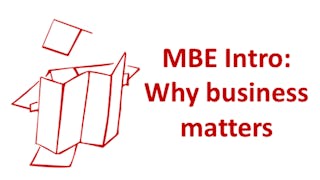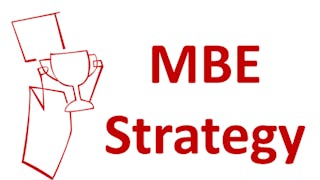Supply chain and operations are the bulk of what you see; it’s the hard work of turning ideas and strategies into tangible products for customers. How does the coffee bean turn into your Starbucks coffee? Answer: a LOT of operations



Mastering Business Essentials: Operations
Ce cours fait partie de Spécialisation MBE Mastering Business Essentials

Instructeur : John Kim
Enseignant de premier plan
Inclus avec 
Expérience recommandée
Ce que vous apprendrez
Explain supply chain and operations to your cousin.
Find the 20% that drive 80% of results.
Compétences que vous acquerrez
- Catégorie : Cost Reduction
- Catégorie : Lean Methodologies
- Catégorie : Supply Chain
- Catégorie : Prioritization
- Catégorie : Process Improvement
- Catégorie : Supply Chain Management
- Catégorie : Lean Manufacturing
- Catégorie : Six Sigma Methodology
- Catégorie : Business Process Management
Détails à connaître

Ajouter à votre profil LinkedIn
juin 2025
2 devoirs
Découvrez comment les employés des entreprises prestigieuses maîtrisent des compétences recherchées

Élaborez votre expertise du sujet
- Apprenez de nouveaux concepts auprès d'experts du secteur
- Acquérez une compréhension de base d'un sujet ou d'un outil
- Développez des compétences professionnelles avec des projets pratiques
- Obtenez un certificat professionnel partageable

Il y a 5 modules dans ce cours
Supply chain is a massive topic; it describes the entire lifecycle of the product - from the raw ingredients, to the planning, manufacturing, and eventual distribution to the end customer. Remember that a cup of coffee started out as coffee beans. So, operations turns strategy into reality. Operations is difficult because it requires significant effort, coordination, risk, and trade-offs. The good news is that global trade increased 10x over the last 50 years. The bad news is that protectionism (e.g., tariffs) are on the rise and geopolitics can negatively influence free trade.
Inclus
2 vidéos2 lectures
The SCOR (Supply Chain Operations Reference guide) is a simple way to think about supply chain and organize it into buckets. Matching supply and demand “as accurately as possible” for all the different supplies, products, customers, locations. Buying all the necessary materials, equipment, labor to build bikes at the “right” quality and “right” costs. Manufacturing products “to specification” while running the factory flexibly, efficiently, and safely. Getting products to customers accurately, on-time, at lowest acceptable cost.
Inclus
3 vidéos1 lecture1 devoir
Build-to-stock products are made in advance with the goal of creating economies of scale (and lower costs). Make-to-order products are built after the order is placed, to allow for more customization and less inventory. Services are “made” and “delivered” at the same time. It requires having enough of the right people to meet the demand. Digital assets are unique because it’s easy/cheap to copy and distribute widely to the second, third. . . thousandth customer.
Inclus
3 vidéos1 lecture
There are 3 parts to this module: 1) Economies of scale matter a lot in business. “The bigger you get, the cheaper you can make your products”. This is why many businesses try to keep growing. 2) In addition to this scale, there has also been drive to improve productivity through standardization. The Toyota Production System (TPS) revolutionized how cars were made by emphasizing quality as the most important production criteria. The idea was that quality was the “first domino” that led to better flow, lower costs. 3) Lean focuses on speed and efficiency. Six Sigma focused on accuracy and reliable. Both are useful and complementary.
Inclus
4 vidéos1 lecture1 devoir
This is the last module in the specialization and it's focused on prioritization. We all know that it's easy to be distracted and waste time. It's important to focus on the “stuff that matters”. One way to do this is to focus on CTQ (what is truly critical) and also the 80/20 principle. Namely, what are the 20% of inputs that drive the 80% of outputs?
Inclus
5 vidéos1 lecture1 évaluation par les pairs
Obtenez un certificat professionnel
Ajoutez ce titre à votre profil LinkedIn, à votre curriculum vitae ou à votre CV. Partagez-le sur les médias sociaux et dans votre évaluation des performances.
Instructeur

Offert par
En savoir plus sur Business Essentials
 Statut : Essai gratuit
Statut : Essai gratuitEmory University
 Statut : Essai gratuit
Statut : Essai gratuitRutgers the State University of New Jersey
 Statut : Essai gratuit
Statut : Essai gratuitEmory University
 Statut : Essai gratuit
Statut : Essai gratuitRutgers the State University of New Jersey
Pour quelles raisons les étudiants sur Coursera nous choisissent-ils pour leur carrière ?





Ouvrez de nouvelles portes avec Coursera Plus
Accès illimité à 10,000+ cours de niveau international, projets pratiques et programmes de certification prêts à l'emploi - tous inclus dans votre abonnement.
Faites progresser votre carrière avec un diplôme en ligne
Obtenez un diplôme auprès d’universités de renommée mondiale - 100 % en ligne
Rejoignez plus de 3 400 entreprises mondiales qui ont choisi Coursera pour les affaires
Améliorez les compétences de vos employés pour exceller dans l’économie numérique
Foire Aux Questions
This specialization targets 3 groups of people:
1) New college graduates: get smart quickly on business essentials quickly, prepare for interviews, start strong with new jobs
2) Corporate managers: develop a broader, more executive view of the business challenges, make better decisions; persuade with data, influence others (departments / leaders), get more done with same resources
3) Entrepreneurs: find a gap in the market for your product/service, acquire customers and drive word-of-mouth, drive business profits
Albert Einstein famously argued that simplicity is difficult. "If you can't explain it simply, you don't understand it well enough."
As adults, we need to learn selfishly and continually relate content to our lives and careers. These videos are short, but cover the the basics very well, which allows you to take a first-principles approach to learning. As Einstein said, "Education is what you remember, when you forget everything you learned."
John Kim, is an associate professor in the practice, at Emory University. He is a management consultant by experience and passion. He's been teaching strategy, healthcare, and consulting since 2017.
He has a Management Consulting specialization here with 1,300+ reviews with a weighted average 4.9 star rating here.
His teaching style is interactive - yes, even with online videos - and wants you to succeed. See his teaching philosophy here.
Plus de questions
Aide financière disponible,

